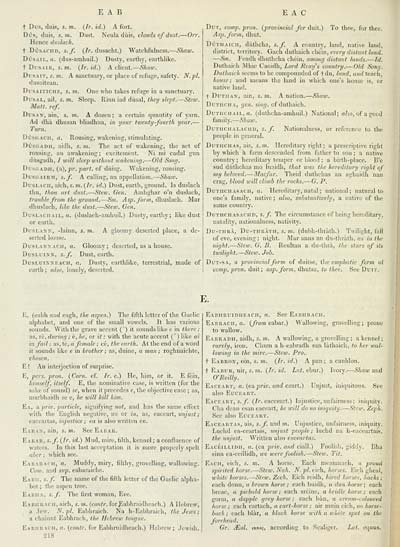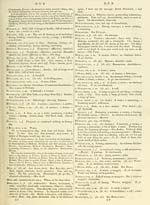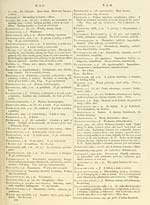Download files
Complete book:
Individual page:
Thumbnail gallery: Grid view | List view

E A B
E A C
t Dus, duis, s. m. {fr. id.) A fort.
Di)s, duis, s. 711. Dust. Neula di'iis, clouds of dust. — On-.
Hence duslach.
t DOs.vciiD, s.f. (Ir. dusacht.) AVatchfulness. — Shaw.
DOs.\iL, a. (dus-amhuil.) Dusty, earthy, earthlike.
t Dis.iiR, s. TO. {Ir.id.) A chent. — Shaic.
DirsAiT, s. m. A sanctuary, or place of refuge, safety. N.pl.
dusaitean.
Dl'saiticiik, s. m. One who takes refuge in a sanctuary.
DrsAL, ail, s. m. Sleep. Rinn iud dùsal, tketj slept. — Slew.
Matt. ref.
DusAN, ain, s. m. A dozen; a certain quantity of yarn.
Ad dhà dhusan bliadhna, in your twenty-fourth year. —
Turn.
DÙSGACII, a. Rousing, wakening, stimulating.
DùsGADn, aidh, s. m. The act of wakening, the act of
rousing, an awakening ; excitement. Ni mi cadal gun
dùsgadh, / will sleep without wakcninrj. — Old Song.
DusGADH, (a), pr. part, of dùisg. Wakening, rousing.
DusGAiUM, s.f. A calling, an appellation. — Shaw.
DusLACii, aich, s. m. (Ir. id.) Dust, earth, ground. Is duslach
thu, thou art dust. — Stew. Gen. Amhghar o'n duslach,
trouble from the ground. — Sm. Asp. form, dhuslach. Mar
dhuslach, like the dust.— -Stew. Gen.
DusLACiiAii,, a. (duslach-anihuil.) Dusty, earthy ; like dust
or earth.
DiJsi.AXX, -laiim, s. m. A gloomy deserted place, a de-
serted house.
DusLANNACii, a. Gloomy; deserted, as a house.
DusLUiNN, s.f. Dust, earth.
DusLUiNSEACii, a. Dusty, earthlike, terrestrial, made of
earth ; also, lonely, deserted.
DuT, comp. pron. {provincial for duit.) To thee, for thee.
Asp. form, dhut.
DOthaicu, dùthcha, s.f. A country, land, native land,
district, territory. Gach duthaich chein, every distant land.
— Sm. Foadh dliuthcha chein, among distant lands. — Id.
Duthaich Mhic Caoidh, Lord Rcny's country. — Old Song.
Duthaich seems to be compounded of fdu, land, aiid teach,
house; and means the land in which one's house is, or
native land.
t Duthan, ain, s. m. A nation. — Shaiv.
Duthciia, gen. sing, of duthaich.
DuTiiciiAiL, a. (duthcha-amhuil.) National; n/so, of a good
family. — Shatv.
DuTiicHALACiiD, S.f. Nationalncss, or refeRMice to tln'
people in general.
DuTiiciiAS, ais, s.m. Hereditary right ; a prescriptive right
by which K farm descended from father to sou ; a native
country ; hereditary temper or blood ; a birth-place. B'e
sud diithchas mo luaidh, that was the hereditary right of
my beloved. — Macfar. Theid duthchas an aghaidh nan
crag, blood will climb the rocks. — G. P.
DuTHCiiASACH, a. Hereditary, natal ; national; natural to
one's family, native; also, substantively, a native of the
same country.
DuTiiciiASACiin, s.f The circumstance of being hereditary,
natality, nationalness, nativity.
Du-TiiRÀ, Di'-THuÀTii, s. m. (dubh.-thràth.) Twilight, fall
of eve, evening; night. ÌMar anns an du-thrùth, as in the
night. — Stov. G. B. Reultan a du-thrà, the stars of itt
twilight. — Steiv. Job.
DuT-SA, a provincial form of duitse, the emphatic form of
comp. ^ron. duit; asp. /on«, dhutsa, <o /Aee. SeeDurr.
E.
E, (eabh and eagh, the aspen.) The fifth letter of the Gaelic
alphabet, and one of the small vowels. It has various
sounds. With the grave accent (') it sounds like c in there;
as, re, during ; è, he, or it : with the acute accent (' ) like ai
in fail ; as, tc, a female ; ce, the earth. At the end of a word
it .sounds like e in brother ; as, duitic, a man ; roghnaichte,
chosen.
E ! An interjection of surprise.
E, pers. pron. {Corn. ef. Ir. c.) He, him, or it. R fein,
himself, itself. E, the nominative case, is written (for the
sake of sound) se, when it precedes e, the objective case ; as,
niarbhaidh se e, he will kill him.
Ea, a priv. particle, signifying not, and has the same effect
with the English negative, un or in, as, eaceart, unjust;
eaceartas, injustice ; ea is also written cii.
Eaban", ain, s.m. SeeEABAU.
Eabau, s.f. {Ir. id.) Mud, mire, hlth, kennel; a confluence of
waters. In this last acceptation it is more properly spelt
aber ; which see.
Eabauach, a. Muddy, miry, filthy, grovelling, vvfallowing.
Cow. and sup. eabaraiclii'.
Eabii, s.f. The name of llu; fifth letter of the Gaelic alpha-
bet ; the aspen tree.
Eabha, s.f. The first woman. Eve.
Eabii iiACii, aich, s. m. (contr. for J^abhrai(lhcach.) A Mebrcw,
a Jew. N.pl. Eabhraich. Na h-Eabhraich, the Jews ;
a chainnt Eabhrach, the Hebrew tongue.
Eabiiracii, a. {contr. for Eabhruidheach.) Hebrew; .Jewish.
218
Eabiiuuidheacit, a. See Eabiihacii.
Eabuacii, a. (/rom eabar.) Wallowing, grovelling; prone
to wallow.
Eabuadii, aidh, s. m. A wallowing, a grovelling ; a kennel ;
rarely, iron. Chum a heabradh san lùthaich, to her zual-
lowing in the mire. — Stew. Pro.
t Eabron, oin, s. m. {Ir. id.) A pan ; a cauldon.
t Eaisur, uir, s. m. {Ir. id. Lat. ebur.) hory. — Shatu and
O'Reilly.
Eaceart, n. (ea prtV. onii ceart.) Unjust, iniquitous. .See
also Euceart.
Eaceaut, s.y. (/;■. eacceart.) Injustice, unfairness; ini(|uity.
Cha dean esan eaceart, he luill do no iniquity. — Stew. Zcph.
See also Euceart.
Eaceartas, ais, s.f. and m. Unjustice, unfairness, iniquity.
Luchd ea-ccartais, unjust people ; luchd na h-eaceartais,
the unjust. Written also evcearlas.
EACEii.i.inii, a. (ea priv. and ciall.) Foolish, gidrlv. lihu
sinn ea-ceillidh, ive were foolish. — Stew. Tit.
Each, eich, s. m. A horse. Each meamnach, a proud
spirited horse. — Stciv.Nah. N.pl. eich, horses. Eich gheal,
white horses. — Slew. Zech. Eich reidh, hired horses. Iiacks ;
each donn, a brown horse; each buidh, a dun horse; each
breac, a piebald horse ; each srcine, a bridle horse ; each
gorm, a dapple grey horse ; each ban, a cream-coloured
horse ; each cartaeh, a cart-horse ; air muineich, on horse-
back ; each blàr, a black horse with a white spot on the
forehead.
Gr. jEoI. ixko;, according to Scaliger. Lat. equus.
E A C
t Dus, duis, s. m. {fr. id.) A fort.
Di)s, duis, s. 711. Dust. Neula di'iis, clouds of dust. — On-.
Hence duslach.
t DOs.vciiD, s.f. (Ir. dusacht.) AVatchfulness. — Shaw.
DOs.\iL, a. (dus-amhuil.) Dusty, earthy, earthlike.
t Dis.iiR, s. TO. {Ir.id.) A chent. — Shaic.
DirsAiT, s. m. A sanctuary, or place of refuge, safety. N.pl.
dusaitean.
Dl'saiticiik, s. m. One who takes refuge in a sanctuary.
DrsAL, ail, s. m. Sleep. Rinn iud dùsal, tketj slept. — Slew.
Matt. ref.
DusAN, ain, s. m. A dozen; a certain quantity of yarn.
Ad dhà dhusan bliadhna, in your twenty-fourth year. —
Turn.
DÙSGACII, a. Rousing, wakening, stimulating.
DùsGADn, aidh, s. m. The act of wakening, the act of
rousing, an awakening ; excitement. Ni mi cadal gun
dùsgadh, / will sleep without wakcninrj. — Old Song.
DusGADH, (a), pr. part, of dùisg. Wakening, rousing.
DusGAiUM, s.f. A calling, an appellation. — Shaw.
DusLACii, aich, s. m. (Ir. id.) Dust, earth, ground. Is duslach
thu, thou art dust. — Stew. Gen. Amhghar o'n duslach,
trouble from the ground. — Sm. Asp. form, dhuslach. Mar
dhuslach, like the dust.— -Stew. Gen.
DusLACiiAii,, a. (duslach-anihuil.) Dusty, earthy ; like dust
or earth.
DiJsi.AXX, -laiim, s. m. A gloomy deserted place, a de-
serted house.
DusLANNACii, a. Gloomy; deserted, as a house.
DusLUiNN, s.f. Dust, earth.
DusLUiNSEACii, a. Dusty, earthlike, terrestrial, made of
earth ; also, lonely, deserted.
DuT, comp. pron. {provincial for duit.) To thee, for thee.
Asp. form, dhut.
DOthaicu, dùthcha, s.f. A country, land, native land,
district, territory. Gach duthaich chein, every distant land.
— Sm. Foadh dliuthcha chein, among distant lands. — Id.
Duthaich Mhic Caoidh, Lord Rcny's country. — Old Song.
Duthaich seems to be compounded of fdu, land, aiid teach,
house; and means the land in which one's house is, or
native land.
t Duthan, ain, s. m. A nation. — Shaiv.
Duthciia, gen. sing, of duthaich.
DuTiiciiAiL, a. (duthcha-amhuil.) National; n/so, of a good
family. — Shatv.
DuTiicHALACiiD, S.f. Nationalncss, or refeRMice to tln'
people in general.
DuTiiciiAS, ais, s.m. Hereditary right ; a prescriptive right
by which K farm descended from father to sou ; a native
country ; hereditary temper or blood ; a birth-place. B'e
sud diithchas mo luaidh, that was the hereditary right of
my beloved. — Macfar. Theid duthchas an aghaidh nan
crag, blood will climb the rocks. — G. P.
DuTHCiiASACH, a. Hereditary, natal ; national; natural to
one's family, native; also, substantively, a native of the
same country.
DuTiiciiASACiin, s.f The circumstance of being hereditary,
natality, nationalness, nativity.
Du-TiiRÀ, Di'-THuÀTii, s. m. (dubh.-thràth.) Twilight, fall
of eve, evening; night. ÌMar anns an du-thrùth, as in the
night. — Stov. G. B. Reultan a du-thrà, the stars of itt
twilight. — Steiv. Job.
DuT-SA, a provincial form of duitse, the emphatic form of
comp. ^ron. duit; asp. /on«, dhutsa, <o /Aee. SeeDurr.
E.
E, (eabh and eagh, the aspen.) The fifth letter of the Gaelic
alphabet, and one of the small vowels. It has various
sounds. With the grave accent (') it sounds like c in there;
as, re, during ; è, he, or it : with the acute accent (' ) like ai
in fail ; as, tc, a female ; ce, the earth. At the end of a word
it .sounds like e in brother ; as, duitic, a man ; roghnaichte,
chosen.
E ! An interjection of surprise.
E, pers. pron. {Corn. ef. Ir. c.) He, him, or it. R fein,
himself, itself. E, the nominative case, is written (for the
sake of sound) se, when it precedes e, the objective case ; as,
niarbhaidh se e, he will kill him.
Ea, a priv. particle, signifying not, and has the same effect
with the English negative, un or in, as, eaceart, unjust;
eaceartas, injustice ; ea is also written cii.
Eaban", ain, s.m. SeeEABAU.
Eabau, s.f. {Ir. id.) Mud, mire, hlth, kennel; a confluence of
waters. In this last acceptation it is more properly spelt
aber ; which see.
Eabauach, a. Muddy, miry, filthy, grovelling, vvfallowing.
Cow. and sup. eabaraiclii'.
Eabii, s.f. The name of llu; fifth letter of the Gaelic alpha-
bet ; the aspen tree.
Eabha, s.f. The first woman. Eve.
Eabii iiACii, aich, s. m. (contr. for J^abhrai(lhcach.) A Mebrcw,
a Jew. N.pl. Eabhraich. Na h-Eabhraich, the Jews ;
a chainnt Eabhrach, the Hebrew tongue.
Eabiiracii, a. {contr. for Eabhruidheach.) Hebrew; .Jewish.
218
Eabiiuuidheacit, a. See Eabiihacii.
Eabuacii, a. (/rom eabar.) Wallowing, grovelling; prone
to wallow.
Eabuadii, aidh, s. m. A wallowing, a grovelling ; a kennel ;
rarely, iron. Chum a heabradh san lùthaich, to her zual-
lowing in the mire. — Stew. Pro.
t Eabron, oin, s. m. {Ir. id.) A pan ; a cauldon.
t Eaisur, uir, s. m. {Ir. id. Lat. ebur.) hory. — Shatu and
O'Reilly.
Eaceart, n. (ea prtV. onii ceart.) Unjust, iniquitous. .See
also Euceart.
Eaceaut, s.y. (/;■. eacceart.) Injustice, unfairness; ini(|uity.
Cha dean esan eaceart, he luill do no iniquity. — Stew. Zcph.
See also Euceart.
Eaceartas, ais, s.f. and m. Unjustice, unfairness, iniquity.
Luchd ea-ccartais, unjust people ; luchd na h-eaceartais,
the unjust. Written also evcearlas.
EACEii.i.inii, a. (ea priv. and ciall.) Foolish, gidrlv. lihu
sinn ea-ceillidh, ive were foolish. — Stew. Tit.
Each, eich, s. m. A horse. Each meamnach, a proud
spirited horse. — Stciv.Nah. N.pl. eich, horses. Eich gheal,
white horses. — Slew. Zech. Eich reidh, hired horses. Iiacks ;
each donn, a brown horse; each buidh, a dun horse; each
breac, a piebald horse ; each srcine, a bridle horse ; each
gorm, a dapple grey horse ; each ban, a cream-coloured
horse ; each cartaeh, a cart-horse ; air muineich, on horse-
back ; each blàr, a black horse with a white spot on the
forehead.
Gr. jEoI. ixko;, according to Scaliger. Lat. equus.
Set display mode to: Large image | Transcription
Images and transcriptions on this page, including medium image downloads, may be used under the Creative Commons Attribution 4.0 International Licence unless otherwise stated. ![]()
| Early Gaelic Book Collections > J. F. Campbell Collection > Gaelic dictionary, in two parts > (308) |
|---|
| Permanent URL | https://digital.nls.uk/79301770 |
|---|
| Description | Volumes from a collection of 610 books rich in Highland folklore, Ossianic literature and other Celtic subjects. Many of the books annotated by John Francis Campbell of Islay, who assembled the collection. |
|---|
| Description | Selected items from five 'Special and Named Printed Collections'. Includes books in Gaelic and other Celtic languages, works about the Gaels, their languages, literature, culture and history. |
|---|

